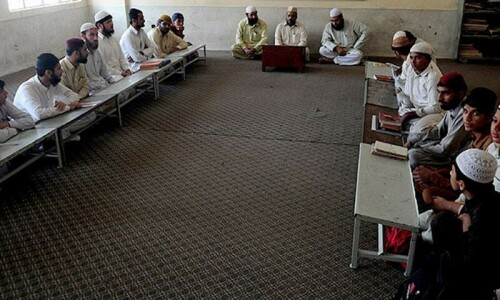WASHINGTON, June 20: The arrest of a Kashmiri activist in the United States, with confessed links to Al Qaeda, will increase pressure on Pakistan to crackdown on Kashmiri groups, observers said on Friday.
Iyman Faris, 34, whose real name is Mohammed Rauf, is pleading guilty.
His arrest would also increase the surveillance of Pakistanis and other Muslims who have already been signalled out for extra- scrutiny since the Sept 11 terrorist attacks, the observers said.
For Pakistan, there could not have been a worse time for this story to appear in the US newspapers — the day President Pervez Musharraf lands in Boston for a key US visit.
Pakistani diplomats fear that the president may have to face several embarrassing questions on the links between Al Qaeda and Kashmiri groups during his press engagements in the United States.
US Attorney General John Ashcroft told a news conference that the Azad Kashmir native came to the United States in May 1994 and became a naturalized US citizen in December 1999.
Mr Ashcroft would not discuss where or when Faris, who drove trucks for a living, was arrested.
Faris provided cash, thousands of sleeping bags, aeroplane tickets and cellular telephones to Al Qaeda operatives, Mr Ashcroft said. From late 2000 to March this year, he spent much of his time “scouting sites for acts of terrorism in the United States”, Ashcroft said.
“Faris led a secret double life,” Mr Ashcroft said, seeking flight training, travelling to Pakistan and Afghanistan, and meeting with Osama bin Laden in late 2000. He met with two ‘senior Al Qaeda figures’ one of whom officials told NBC News was Mohammed in 2000, 2001 and early 2002 in Afghanistan and Pakistan, the US attorney general said.
Faris had acknowledged that he met Osama bin Laden in 2000 at an Al Qaeda training camp in Afghanistan and provided operatives there with sleeping bags, cell phones and other assistance.
Faris pleaded guilty on May 1 to providing material support to terrorists and conspiracy to provide support, according to documents unsealed on Thursday in US District Court in Alexandria, near Washington DC.
Authorities said Faris received attack instructions from top terror leader Khalid Shaikh Mohammed for what they suggested might have been a second wave planned for New York and Washington to follow the attacks of Sept 11.
Faris, who is represented by a lawyer, said in the documents he was not coerced to plead, could face 20 years in prison and up to $500,000 in fines. Sentencing was set for Aug 1.
Court documents also show that Khalid Shaikh Mohammed, a top Al Qaeda planner now in US custody, identified Faris.
The officials said that Shaikh Mohammed, who was captured on March 1 in Pakistan, told US authorities that Faris had been trained to blow up bridges and derail trains. One of his assignments was to explore the possibility of bringing down the Brooklyn Bridge in New York, US officials said.
They said that Faris had been cooperating with interrogators since his arrest and had pleaded guilty to providing material support to a terrorist organization and conspiracy to provide such support.















































Dear visitor, the comments section is undergoing an overhaul and will return soon.